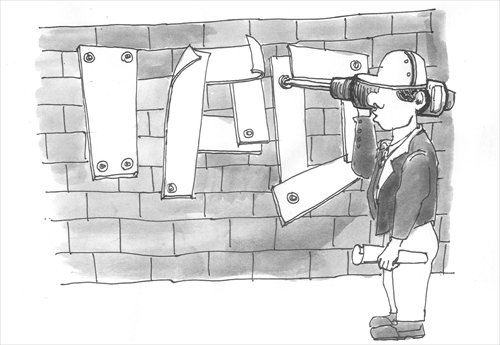HOME >> BUSINESS
Implementing laws essential for curbing accounting fraud
Source:Global Times Published: 2015-5-25 18:48:01
Spirit of proper ethics should be fostered

Illustration: Luo Xuan/GT
There have been some cases of accounting fraud in the past few years among Chinese firms seeking a market listing, both domestically and overseas, stoking concerns over the professional ethics of financial staff, accountants and auditors.
In an article posted in February revealing the result of a yearlong dispute between the Chinese affiliates of the "Big Four" accounting firms and the US Securities and Exchange Commission (SEC), the Wall Street Journal gave a clue as to how rampant account fraud used to be among US-traded Chinese firms.
The China-based affiliates agreed to pay $500,000 each to settle the dispute over their reluctance to turn over audit documents about Chinese companies under investigation, the SEC said in February.
"The dispute stems from the wave of 170-plus US-traded Chinese companies - most of them smaller, not China's best-known and largest companies - that have faced accounting questions in recent years," read the article, without giving a timeline.
It should be noted that the number of fraud cases has fallen recently. But it is hard to root out fraud from any financial system, especially from an expanding market, in which high growth figures can distract attention from fraud prevention efforts.
Auditors and companies' chief financial officers (CFOs) need to be mindful about the potential for fraud to happen, particularly in cash-rich organizations.
To curb the risk of fraudulent practices, a code of ethics needs to be established from the very beginning for both local financial staff and employees of overseas institutions involved in financial activities in the Chinese market.
An example is the UK-based Association of Chartered Certified Accountants, which has several prerequisites for its students and members, including the requirement to pass the association's ethics module.
In addition to self-discipline, there also needs to be efficient oversight and strong laws and regulations to restrict fraudulent accounting practices.
For instance, the UK's Bribery Act makes it illegal for companies to offer bribes or fraudulent inducements in order to make a deal. This means that if UK companies are found to have committed bribery in China, they can still be prosecuted in the UK. The US has a similar law.
Accounting fraud is a blight that must be addressed legally, despite some of the nice titles for it, such as white-collar crime.
This refers to non-violent, financially motivated wrongdoings by businesses or government officials. Such crimes may not involve physical damage, and violent crime is perceived as a bigger problem, but people who commit financial misdeeds are criminals who should be subject to legal penalties.
Generally, there is a sufficient number of regulations, but the real problem has been with implementation. China must ensure that laws and regulations that have already been passed are abided by - this is the only proper way to control people who might otherwise take advantage of their positions and conduct financial fraudulence.
Besides making a contribution to the spirit of integrity, honesty and ethics in the conduct of accounting and auditing, financial staff at the increasing number of Chinese firms eyeing overseas expansion should broaden their vision beyond the borders of technical skills.
This is of particular importance for the CFOs. They should be taking on other roles - not only what traditionally falls within the purview of a CFO, but skills in negotiations and communications, among others - which would help smoothen overseas expansion plans or mergers and acquisitions activities by their firms.
The article is based on a group interview with Anthony Harbinson, president of the UK-based Association of Chartered Certified Accountants (ACCA). He is currently the director of Safer Communities for the Northern Ireland Department of Justice. bizopinion@globaltimes.com.cn
Posted in: Expert assessment